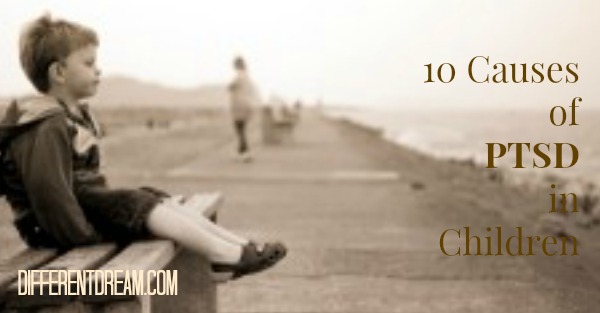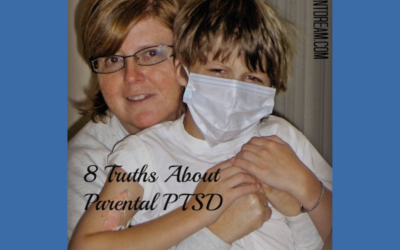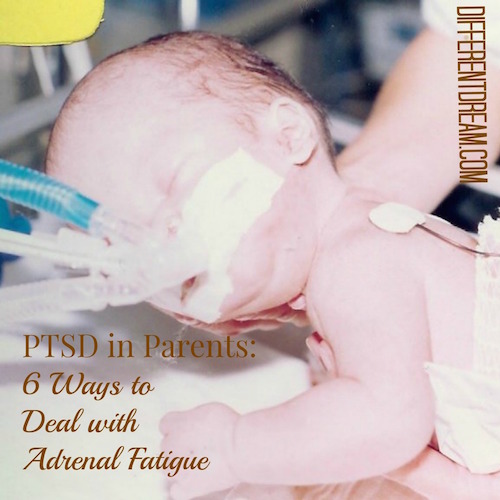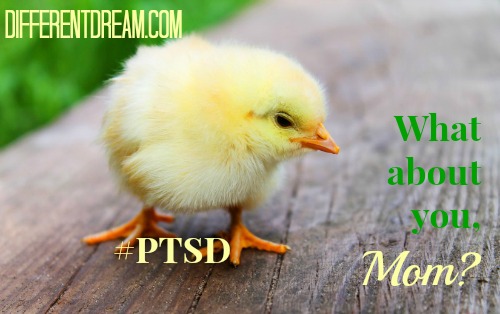10 Causes of PTSD in Children

Post-traumatic stress disorder (PTSD) is a mental illness vastly under-diagnosed in children. For that reason, I’ve been guest blogging about the topic at Friendship Circle of Michigan’s website. Previous posts in this series explained why I advocate for children with post-traumatic stress disorder (PTSD), explored 5 myths and misconceptions about PTSD in children, and defined both trauma and PTSD from a child’s point of view.
Causes of PTSD in Children
The most recent post in the series identified the following ten causes of PTSD in kids:
- Medical intervention
- Abuse
- Neglect
- Disasters
- Violent acts
- Accidents
- Divorce
- The death of a significant loved one
- Moving
- Adoption
Trauma in the Eyes of a Child
If you’re shaking your head and thinking, “She’s pulling my leg. Those aren’t traumatic events,” then you’re looking at them with the eyes of an adult rather than from a child’s point of view. That train of thought and more detailed explanations of each of the ten items on the list can be found at the blog post 10 Causes of Post-Traumatic Stress Disorder in Children at Friendship Circle’s website.
More Articles about PTSD in Children
Other articles about PTSD in kids at this website include:
- Linking PTSD and Medical Trauma, Part 1
- Linking PTSD and Medical Trauma, Part 2
- Where to Learn about PTSD in Kids
Your PTSD Experience
Did you deal with PTSD as a child? Is your child dealing with it now…or do you suspect PTSD? If so, leave a comment about how the condition was diagnosed and treated. Or if you have questions, go ahead and ask. I’ll try to answer or direct you to resources where you can find answers.
Do you like what you see at DifferentDream.com? You can receive more great content by subscribing to the quarterly Different Dream newsletter and signing up for the daily RSS feed delivered to your email inbox. You can sign up for the first in the pop-up box and the second at the bottom of this page.
By Jolene
Jolene Philo is the author of several books for the caregiving community. She speaks at parenting and special needs conferences around the country. Sharing Love Abundantly With Special Needs Families: The 5 Love Languages® for Parents Raising Children with Disabilities, which she co-authored with Dr. Gary Chapman, was released in August of 2019 and is available at local bookstores, their bookstore website, and Amazon. See Jane Dance!, the third book in the West River cozy mystery series, which features characters affected by disability, was released in October of 2023.
12 Comments
Submit a Comment
Subscribe for Updates from Jolene
Related Posts
8 Truths about PTSD in Parents of Kids with Special Needs
These 8 truths about PTSD in parents of kids with special needs from Barb Dittrich offer practical advice and encouragement to families.
PTSD in Parents: 6 Ways to Deal with Adrenal Fatigue
Different Dream’s series about PTSD & parents of kids with special needs continues with Rachel Olstad’s post about how to deal with adrenal fatigue.
Special Needs Parents and PTSD: What About You, Mom?
Special needs parents and PTSD. Words that shouldn’t go together. But if both words are part of your life, follow these 6 steps to find a trauma therapist.






You’re welcome!
*GoD Bless! 😉
Thank you Jolene, for taking the time to read my post and too, for editing it down to the basics…. 😉 I would be VERY open to more info and treatment possibilities, thank you!! Anything you can share will be appreciated tons!!
Gos Bless!
M
Dear M,
Thank you so much for your feedback and for sharing your story. I read every word, but thought it wisest not to put all of it on the blog for the world to see. I wholeheartedly agree that these little boys are dealing with PTSD and am so sorry about what they’ve experienced. If you want more information about treatment possibilities, please let me know.
Best wishes,
Jolene
Hi Jolene
First I want to THANK YOU for being one of, what seems like, very few who address the issue of PTSD in children and for validating that children DO have FEELINGS and gone unrecognized, they can become very troublesome for these children as adults.
Thank you so much for doing what you do!!
M
Dear Ruth,
Your words are very wise. PTSD is often misdiagnosed as ADHD or bipolar disorder. It also can affect learning because it’s hard for children to focus on new information when they’re constantly on edge, waiting for the next terrible thing to happen. PTSD is more treatable than the misdiagnoses and treatment can minimize learning problems. That’s why I keep writing about this topic–to inform parents so kids get the help they need.
Jolene
Thanks for your well wishes, Wendy, and for the story of your remarkably perceptive kindergarten teacher. The world needs more teachers like her.
Jolene
Hi Jolene,
I am definitely interested in being interviewed for your book if you think a narrative of my experience might be of use.
Thanks, for addressing this subject. I see it in a lot of places. Often times another diagnosis such adhd or various learning disabilities mask it. I work with a lot of children who’ve been adopted. They often have the symptoms for PTSD but it seems like it gets missed. Thanks again, for looking at this topic.
Hi Jolene,
Thanks for all you do in behalf of kids and parents with regard to children and PTSD. I had PTSD as an infant and child but didn’t know it. My parents did not either. My PTSD resulted from an infant surgery likely done without anesthetic and/or adequate pain control. In kindergarten, I apparently isolated myself a lot. Because of my wonderful teacher, Miss Anderson, I was able to make a leap in healing. She asked my mother in for a consultation, where my mother told her about my difficult beginning. She told the teacher all about the surgery I had and the adjustment period when I got home from the hospital. From this discussion, the teacher created a plan. Every day she sat me with the same 3 children for snack. I don’t remember, but my mother tells me that I was able to begin to socialize with the other children. Funny that the only thing I can recall about kindergarten is doing things alone or with the teacher or with the group and the teacher leading. But I also remember loving kindergarten so her intervention saved me. More parents and teachers need to know about PTSD in children. Good luck with getting your book published. I will be sure to advertise it on myincision. Perhaps you could do a guest post about it.
Dear Shelby,
You are most welcome. I’m sorry to hear your daughter is still struggling with PTSD and the accompanying anxiety. Her story is one reason I write about the subject and am trying to get a publisher interested enough to pick up my book project.
Praying for you,
Jolene
Hi Jolene. Thank you for talking and writing about PTSD in children. My 11 year old has been diagnosed with it and severe seperation anxiety disorder due to medical trauma. Both ‘rear their ugly beard’s often in her life. She doesn’t want it to happen and hares it when it does. The more adults can learn about this the better possiblity the children who suffer from it will have to recover. Thank you so much